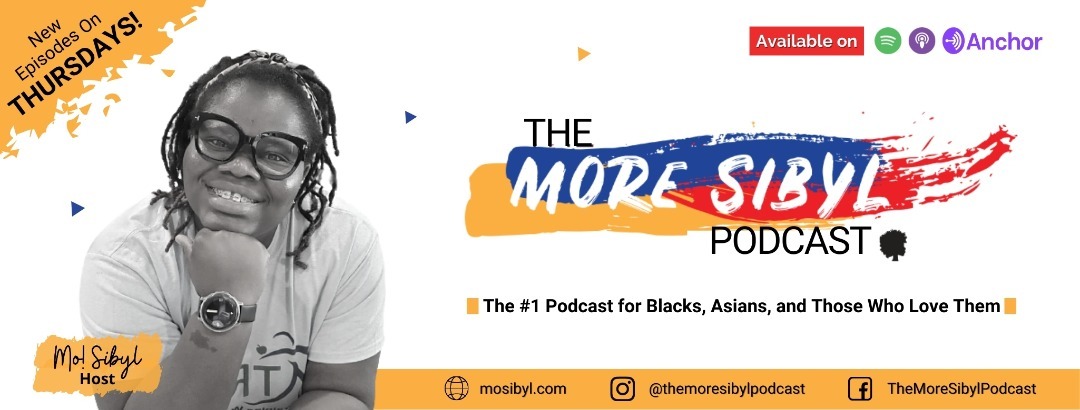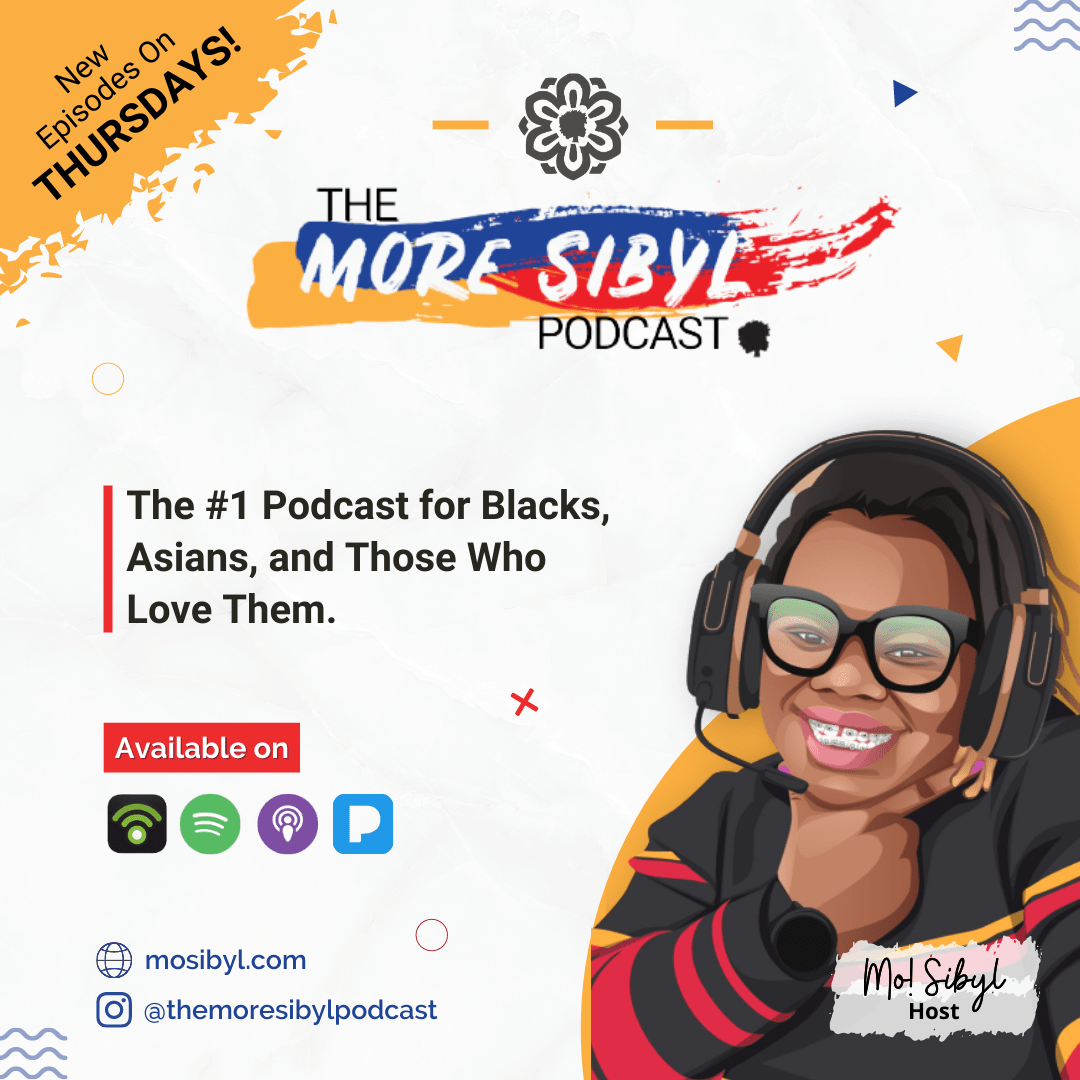
8.9K
Downloads
309
Episodes
The More Sibyl Podcast is hosted by Mo! Sibyl - a Nigerian-born, US-educated, Korean-speaking, Struggling Intellectual. The More Sibyl Podcast is a podcast about culture and culture nomads designed for Blacks and Asians and those who love them. On The More Sibyl Podcast, Mo! talks mostly with an invited guest, who she is inspired by, on a variety of issues, related to cultural experiences or other lived experiences related to third culture. If your concept of home is fluid, you feel like you are neither here nor there, or you consider yourself a cultural hybrid, then this podcast is for you. Support this podcast: https://anchor.fm/mosibyl/support
Episodes
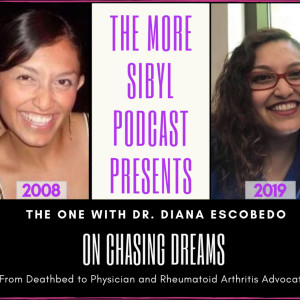
Thursday Jul 25, 2019
Thursday Jul 25, 2019
Here’s the much-anticipated story of the other woman – aka Dr. Diana Escobedo or Diana as I fondly call her. Because you get “more” listening to the show, we also explored her life. In addition to the unique role she plays in our lives, Diana comes with her own story.
She was raised in Mexico and grew up in a less-traditional household where children were given free reins to explore their unique individuality. With this flippant freedom, Diana found herself pregnant at 16. Yet, she pushed through this and completed medical school only to be bedridden for almost two years. With her liver failing, and a looming diagnosis of the autoimmune condition – rheumatoid arthritis, she was at the brink of death.
Listen to hear more on how Diana turned all of these around, broke the family cycle of alcoholism, found purpose in her suffering, and her suggestions on how not to give up on our own dreams too. Diana is now a licensed family medicine practitioner and will be opening up her clinic in the El-Paso area with a focus on providing care to low-income families. Also, hear about the key people that helped her get from there to here.
Listen, download, share, and please leave a comment to support the show!
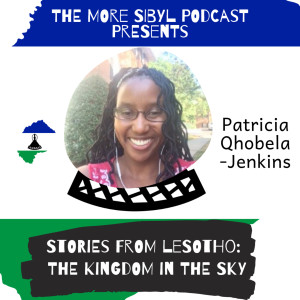
Thursday Jul 18, 2019
Thursday Jul 18, 2019
The More Sibyl Podcast Presents:
하늘의 왕국| The One with Patricia Qhobela-Jenkins: Stories from Lesotho – The Kingdom in the Sky: Episode 18
Still on Africa! Today I bring you stories from an expat Brit/Mosotho who was born in the UK to Mosotho (refers to persons from Lesotho) parents. When she was 16, she was whisked back to Africa, which made for a lot of stories that we unpacked in this episode. Patricia Qhobela-Jenkins, who I once dubbed ‘African Leprechaun’ the very instant I met her, and I talked about Lesotho’s history relative to Africa’s and why we don’t know so much about her country, her losing both parents and the process of grieving, as well as upholding choices regarding marriage and decisions not to have kids. Lesotho, a constitutional monarchy, regards water as white gold and exports it to South Africa to boost its economy. Lesotho, where owning cows is a sign of wealth, is a beautiful country with hillsides reminiscent of The Shire, traditional ponies, and lush greens but find out why I won’t be visiting it anytime soon.
Patricia is the founder of Podcast Maven (www.podcastmaven.com), and for over four years has helped introvert female business owners find their voice, connect to their audience, and launch their unique podcast.
Follow Patricia on IG: @the_podcast_maven
PS: Looking for investors and partners for a cultural exchange program idea I have for Africans and Asians.
Listen, download, share, and please leave a comment to support the show!
Recommended Song: “This is Me” – New Found Glory (2019)
Visit www.mosibyl.com to see show notes.
--- Support this podcast: https://anchor.fm/mosibyl/support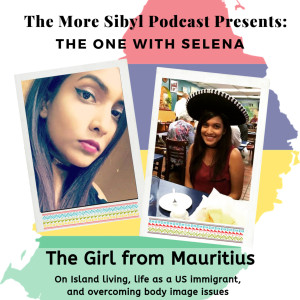
Thursday Jul 11, 2019
Thursday Jul 11, 2019
The More Sibyl Podcast Presents: The One with Selena: The Girl from Mauritius – On Island Living
Let’s explore an African country together in this episode. And no, it’s not Nigeria, haha.
Welcome to the Island, peeps! This African island boasts of enviable beaches for destination weddings. It is a religiously diverse nation, with freedom of religion given as a constitutional right and the only African country with a Hindu majority. As Hawaii is seen drifting away from the continental US, so is this country relative to Africa when viewed on a map. It’s also a country close to Madagascar and the only known habitat of the now-extinct bird – dodo. Mark Twain once quipped that Heaven was copied after this country and Lewis Carroll was inspired by the dodo to write his famous book “Alice in Wonderland” in 1865. Life expectancy here is well higher than the world average and is well above the average for African countries.
Welcome to Mauritius – one of only four countries in the world with no involvement in ongoing international or domestic conflicts and no tensions with neighboring countries. The others being Botswana, Chile, and Uruguay.. As a result, Mauritius does not maintain a standing army.
I invited Selena – who I describe as a spunky, ethnically-ambiguous, culturally-rich, cosmopolitan, Mauritian gal - to talk about her country’s history, its unique aspects, and what her identity and nationality mean to her. We also talked about her overcoming body image issues, experiences as a US immigrant, and how she responds to questions about her origin.
Recommended Song: “Lingua Lebi” – Talulu (2006)
Enjoy,
모 /Mo!/
--- Support this podcast: https://anchor.fm/mosibyl/support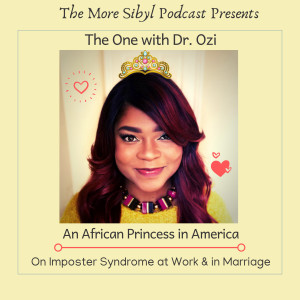
Thursday Jul 04, 2019
Thursday Jul 04, 2019
The More Sibyl Podcast Presents: The One with Dr. Ozi: Tales of an African Princess in America – On Imposter Syndrome at Work and in Marriage
What do you call it when two podcasters come together to talk about podcasting (and so much more) on a podcast? A meta-fricking moment! Today, you guys get not one, but two African royalties, both with PhDs, dripping in finesse and sauce. In this episode with Dr. Ozi of the Tales of an African Princess in America Podcast, we unpacked a lot on imposter syndrome, its root causes, impact on our work and marriages, and how we have tried tackling it. We also talked about the importance of having mentors, not only in the workplace. If anything, you also get to hear two nerds gush about their research. Special shout-out to Mr. Kenny (from Episode 30, 2018) who made this connection happen!
Ozi is a fashion guru who lives in the music city of Nashville, Tennessee where she does research on sarcoidosis. #Peng
What Dr. Ozi and I have in common:
- We are both kicka$$ podcasters and storytellers.
- We are total nerds and can gush about our research all day.
- We both work on research areas involving rare diseases – she, sarcoidosis, and I – lupus erythematosus.
- Our disease areas both have gender and ethnicity disparities; sarcoidosis and lupus affect more Blacks and females.
Recommended Song: “So Far So Good” – Phyno (2017)
--- Support this podcast: https://anchor.fm/mosibyl/support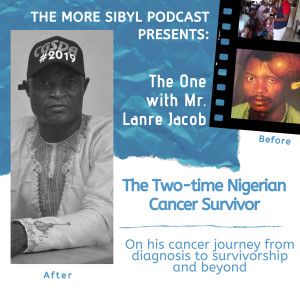
Thursday Jun 27, 2019
Thursday Jun 27, 2019
The More Sibyl Podcast Presents: The One with Mr. Lanre Jacob – The Two-time Nigerian Cancer Survivor
Cancer has become a major source of mortality and morbidity in Nigeria, and with the growing population, impact of westernization, sedentary lifestyle coupled with genetic factors, cancer is on the rise. Today’s guest – Mr. Lanre Jacob of the Lanre Jacob Sarcoma Foundation - has survived cancer - Dermatofibrosarcoma Protuberans - not once but twice IN NIGERIA. His cancer experience spans three decades with multiple surgeries that have taken a considerable chunk of his head. As a cancer survivor, he went beyond the last stop of the cancer control continuum (survivorship) to become a cancer advocate.
In this episode, we began with his life before diagnosis, the diagnosis odyssey he went through, delayed treatment due to ignorance, and why he is passionate about using his voice to reduce cancer incidence and mortality in Nigeria. We also explored potential opportunities for religious leaders and cancer survivors to lead the campaign in cancer education, reducing stigma, and advocacy. Finally, drawing parallels from our fight against HIV, we talked about why cancer is a war Nigeria is not ready to win given its weak healthcare infrastructure, low budgetary allocation for health, and poor engagement in cancer research.
All in all, I hope this episode serves as a cue for you to go visit your doctor to get a run-down of your numbers and explore potential risk factors, especially for cancer.
PS: Wanna support his foundation and grassroot community efforts on cancer control in Nigeria? Contact him on lanrejacobsarcomafoundation@gmail.com; ljcancerworld.blogspot.com; +2348130133902
PPS: Can you say Dermatofibrosarcoma Protuberans three times without blabbing?
Recommended Song: “El Cóndor Pasa” – Simon & Garfunkel (1964)
Best,
모 /Mo!/
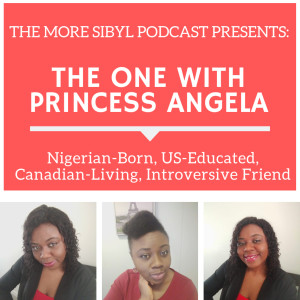
Thursday Jun 20, 2019
Thursday Jun 20, 2019
The awkward conversations replete in today’s episode is made possible by my guest and friend - Angela; a real-life princess (things I do for you guys, honestly), one of my privileged, certified haters (because I don’t even acknowledge the rest), and a dear friend who is totally in awe of my awesomeness.
Angela is the last of 10 kids, which explains why she is really spoilt. She is a geology scientist and one of the many victims of the oil market collapse, which caused her to seek greener pastures in the oil-abundant area of Calgary, Canada. But as all that glitters isn’t always oil and in need of a job, she did a two-minute elevator speech of her resume. So prospective employers, if you are need of skills like hers, kindly email her on angieluwa@gmail.com
Angela has overcome a lot to be where she is today, especially a delicate, high-risk surgery to treat her chronic back pain from sciatica. And I could not be more proud of her, especially her resolve to find meaningfulness in suffering. That said, I will wish for her to quit her chronic staple diet of Yoruba Demons (and I speak freely on this issue as a Yoruba person) as they have brought nothing but indigestion to her. So, I conducted an intervention for that, and she also used the opportunity to talk about what she wants in a mate. So if you are single and NOT YORUBA, kindly inquire within.
Most importantly, Angela is kind, caring, very thoughtful, and genuine. She will always be unforgettable for a lot of reasons – chief among is how she worked in cahoots with my husband to throw me a surprise party for my 30th birthday that had over 60 people in attendance. I am yet to forgive this transgression.
Love you, Angie. 2,999 times!
--- Support this podcast: https://anchor.fm/mosibyl/support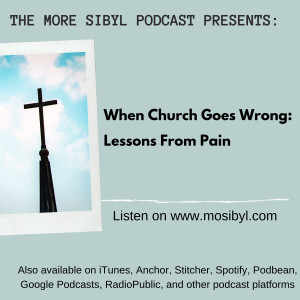
Thursday Jun 13, 2019
Thursday Jun 13, 2019
In light of the COZA events, a guest and I explored societal influences on the churches' reactions to such happenings. Also, a take on cultural influence on religion and reverence for men of God, and so much more.
--- Support this podcast: https://anchor.fm/mosibyl/support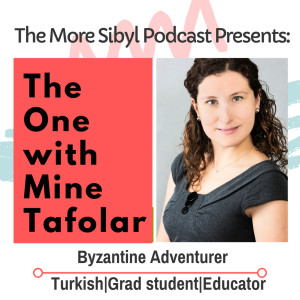
Thursday Jun 06, 2019
터키 모험가| The One with Mine Tafolar – The Turkish Adventurer: Episode 12 (2019)
Thursday Jun 06, 2019
Thursday Jun 06, 2019
The More Sibyl Podcast Presents: The One with Mine Tafolar – The Turkish Adventurer
Meet Mine Tafolar – Latin American-loving Byzantine lady. I met Mine through a mutual friend of ours – Gio from Nicaragua (hello, Gio! We love you). Mine was born and raised in Istanbul, Turkey, where she studied political science and international relations and history at Bogazici University. She has also worked as a journalist for Hurriyet Daily News and prepared internal and international news stories. She holds an MA degree from the Government Department from the University of Texas at Austin with a thesis titled: Buying Support without Brokers: Conditional Cash Transfers in Turkey and Argentina. Right now, she is a Ph.D. candidate at the Political Science Department at the University of Illinois at Chicago. She's lived in Istanbul, Ankara, Austin, Buenos Aires, and Chicago.
In this episode, we talked about her life, Turkish pride, starting a Ph.D. program, transitioning from being a teaching assistant (TA) to a teaching role, teaching tips, how she deals with imposter syndrome, and her strategies for balancing being a newlywed grad student.
Mine is pronounced – Me Nay.
Read more on www.mosibyl.com
--- Support this podcast: https://anchor.fm/mosibyl/support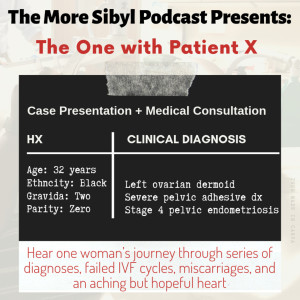
Friday May 31, 2019
Friday May 31, 2019
Part 2:
Here’s a follow-up to Episode 10. In this episode, I present Dr. Alalade with a real-life case scenario of a patient named “X.” Her story touches a lot of points discussed in Episode 10. Patient X is a 32-year-old Black lady who currently resides in the US. She has had two pregnancies that resulted in miscarriages during the first trimester. Her clinical diagnoses include left ovarian dermoid cyst, severe pelvic adhesive disease, and stage-4 pelvic endometriosis. Together, Dr. Alalade and I explore this patient’s history with him providing a handful of options in helping Patient X reach her goal of multiparity.
Patient X may very well likely be someone you know or someone whose story eclipses yours. Regardless of which category you fall under, never quit seeking the answers you need. The hope, in the meantime, is to build community around these difficult, untalked about socio-cultural issues.
Let me know how I can help.
Disclaimer: Please note that all the contents discussed in this episode are not intended to be a substitute for professional medical advice, diagnosis, or treatment. Always seek the advice of your physician or other qualified health provider with any questions you may have regarding a medical condition.
Read more on www.mosibyl.com
--- Support this podcast: https://anchor.fm/mosibyl/support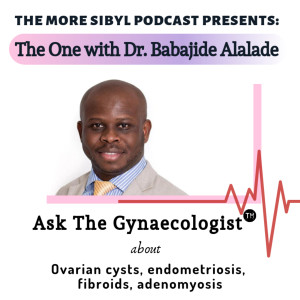
Friday May 31, 2019
Friday May 31, 2019
PART 1:
It all began with this Facebook post I made in March to find answers to some gynecological questions I had. A friend, then, connected me right away with Dr. Alalade – the award-winning, stock market-loving, UK-trained gynaecologist and founder of the Facebook Group – AsktheGynaecologist, which currently boasts more than 1.3 million members worldwide! Dr. Alalade is a diplomate of the Royal College of Obstetricians and Gynaecologists and currently a member of the Institute of Clinical Research UK and Fellow of the Royal Society of Public Health, London. According to him, his mission is to bring about a total change and accessibility to healthcare information in Nigeria and Africa. He is also a fervent promoter and advocate for maternal health issue. Learn more here.
How, then, can pregnancy outcomes be maximized? How are pregnancy outcomes and sexual intercourse affected by ovarian cysts, fibroids, adenomyosis, and endometriosis? Can you tell the differences between these four gynaecological issues? And why do these issues plague more Black women? What foods can worsen or lessen the symptoms from these gynecological issues? Are herbal products safe to use? Why do fibroids cause painful period and sex, and irritable bowel syndrome? How do we prevent and conservatively manage these issues while maximizing fertility outcomes in women of reproductive age? Why does upward mobility from developing to developed countries worsen reproductive outcomes in women?
So many questions. Not to worry, listen to this episode to get the answers.
Read more on www.mosibyl.com
--- Support this podcast: https://anchor.fm/mosibyl/support